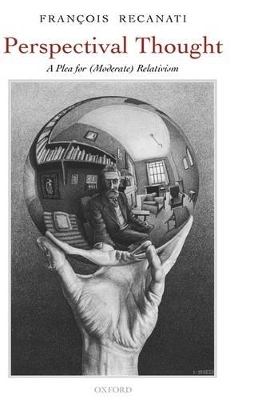
Perspectival Thought
A Plea for (Moderate) Relativism
Seiten
2007
Oxford University Press (Verlag)
978-0-19-923053-2 (ISBN)
Oxford University Press (Verlag)
978-0-19-923053-2 (ISBN)
Francois Recanati presents a ground-breaking study of the context-dependence of our language and thought. He argues that our linguistic and mental representations alike must be assigned two layers of content: the explicit content, which is relative and perspectival, and the complete content, which is absolute and involves contextual factors.
Our thought and talk are situated. They do not take place in a vacuum but always in a context, and they always concern an external situation relative to which they are to be evaluated. Since that is so, François Recanati argues, our linguistic and mental representations alike must be assigned two layers of content: the explicit content, or lekton, is relative and perspectival, while the complete content, which is absolute, involves contextual factors in addition to what is explicitly represented. Far from reducing to the context-independent meaning of the sentence-type or, in the psychological realm, to the 'narrow' content of mental representations, the lekton is a level intermediate between context-invariant meaning and full propositional content. Recognition of that intermediate level is the key to a proper understanding of context-dependence in language and thought.
Going beyond the usual discussions of indexicality and unarticulated constituents in the philosophy of language, Recanati turns to the philosophy of mind for decisive arguments in favour of his approach. He shows, first, that the lekton is the notion of content we need if we are to properly understand the relations between perception, memory, and the imagination, and second, that the psychological 'mode' is what determines the situation the lekton is relative to. In this framework he provides a detailed account of de se thought and the first person point of view. In the last part of the book, Recanati discusses the special freedom we have, in discourse and thought, to shift the situation of evaluation. He traces that freedom to a special mode - the anaphoric mode - which enables us to go beyond the egocentric stage of pre-human thought.
Our thought and talk are situated. They do not take place in a vacuum but always in a context, and they always concern an external situation relative to which they are to be evaluated. Since that is so, François Recanati argues, our linguistic and mental representations alike must be assigned two layers of content: the explicit content, or lekton, is relative and perspectival, while the complete content, which is absolute, involves contextual factors in addition to what is explicitly represented. Far from reducing to the context-independent meaning of the sentence-type or, in the psychological realm, to the 'narrow' content of mental representations, the lekton is a level intermediate between context-invariant meaning and full propositional content. Recognition of that intermediate level is the key to a proper understanding of context-dependence in language and thought.
Going beyond the usual discussions of indexicality and unarticulated constituents in the philosophy of language, Recanati turns to the philosophy of mind for decisive arguments in favour of his approach. He shows, first, that the lekton is the notion of content we need if we are to properly understand the relations between perception, memory, and the imagination, and second, that the psychological 'mode' is what determines the situation the lekton is relative to. In this framework he provides a detailed account of de se thought and the first person point of view. In the last part of the book, Recanati discusses the special freedom we have, in discourse and thought, to shift the situation of evaluation. He traces that freedom to a special mode - the anaphoric mode - which enables us to go beyond the egocentric stage of pre-human thought.
François Recanati is Director of Research, CNRS (Institut Jean-Nicod), and Arché Professorial Fellow, University of St Andrews.
PART 1 : MODERATE RELATIVISM; 1. THE FRAMEWORK; 2. THE DEBATE OVER TEMPORALISM (1) : DO WE NEED TEMPORAL PROPOSITIONS?; 3. THE DEBATE OVER TEMPORALISM (2) : CAN WE BELIEVE TEMPORAL PROPOSITIONS ?; 4. RELATIVIZATION AND INDEXICALITY; PART 2 : EXPERIENCE AND SUBJECTIVITY; 5. CONTENT AND MODE; 6. IMMUNITY TO ERROR THROUGH MISIDENTIFICATION; 7. RELATIVIZATION AND REFLEXIVITY; 8. THE FIRST PERSON POINT OF VIEW; PART 3 : EGOCENTRICITY AND BEYOND; 9. UNARTICULATED CONSTITUENTS IN THE LEKTON ?; 10. SELF-RELATIVE THOUGHTS; 11. SHIFTABILITY
| Erscheint lt. Verlag | 27.9.2007 |
|---|---|
| Verlagsort | Oxford |
| Sprache | englisch |
| Maße | 162 x 241 mm |
| Gewicht | 632 g |
| Themenwelt | Geisteswissenschaften ► Philosophie ► Erkenntnistheorie / Wissenschaftstheorie |
| Geisteswissenschaften ► Philosophie ► Sprachphilosophie | |
| ISBN-10 | 0-19-923053-6 / 0199230536 |
| ISBN-13 | 978-0-19-923053-2 / 9780199230532 |
| Zustand | Neuware |
| Haben Sie eine Frage zum Produkt? |
Mehr entdecken
aus dem Bereich
aus dem Bereich
die Grundlegung der modernen Philosophie
Buch | Softcover (2023)
C.H.Beck (Verlag)
CHF 25,20
Buch | Softcover (2023)
Reclam, Philipp (Verlag)
CHF 9,80

![Was heißt Denken?. Vorlesung Wintersemester 1951/52. [Was bedeutet das alles?] - Martin Heidegger](/media/113619842)
